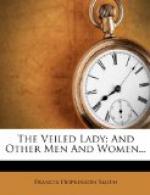“Up? Yes, and lighted every night—up in the public garden in San Juan among the palms and bananas. The people eat ice-cream on the first platform and the band plays Sundays in the balcony under the boat davits. The people are wild about it— especially the women. It was the last coat of red lead that did it.”
And again the office rang with Lawton’s laugh.
MISS MURDOCK,—“SPECIAL”
A row of gas jets hooded by green paper shades lighting a long table at which sit half a dozen men in their shirt sleeves writing like mad; against the wall other men,—one drawing Easter lilies, another blocking in the background around a photograph, a third pasting clippings on sheets of brown paper. Every few minutes a bare-headed boy in a dirty apron, with smudged face and ink-stained fingers, bounds into the stifling, smoke-laden room, skirts the long table, dives through a door labelled “City Editor,” remains an instant and bounds out again, his hands filled with long streamers of proof.
In the opening and shutting of the swinging door a round-bodied, round-headed man in his shirt sleeves comes into view. Covering his forehead, shielding his eyes from the glare of the overhead gas jet, is a half-moon of green leather held in place by strings tied behind his ears. The line of shadow caused by this shade makes a blank space about his eyes and brings into relief his pale, flabby cheeks, hard, straight mouth, and coarse chin. Only when he lifts his head to give some order, or holds the receiver of the telephone to his ear, can his eyes be exactly located. Then they shine like a cat’s in a cellar,— gray, white, gray again, with a glint of metallic green,—always the same distance apart, never wavering, never blinking. Overstrung, overworked, nervous men, working at high pressure, spurred by the merciless lash of passing minutes, have these eyes. So do cornered beasts fighting for air and space. Eleven-thirty had just been tolled by the neighboring clock; deliverance would come when the last form of the morning edition was made up. Until then safety could only be found in constant attack.
Outside the city editor’s office, sprawled over a pile of mail sacks, between the long table and the swinging door, lay Joe Quinn, man-of-all-work,—boy, in fact, for he was but nineteen, big for his age, with arms and legs like cordwood and a back straight and hard as a plank. Joe’s duty was to keep his eyes peeled, his ears open, and his legs in working order. If a reporter wanted a fresh pad, a cup of water, or a file of papers, Joe brought them; sometimes he foraged for sandwiches and beer,—down four pair of stairs, across the street into a cellar and up again; sometimes he carried messages; oftener he made an elevator of himself, running between the presses in the basement and the desk behind the swinging door. Fifty trips in a single night had not been an unusual tally.




